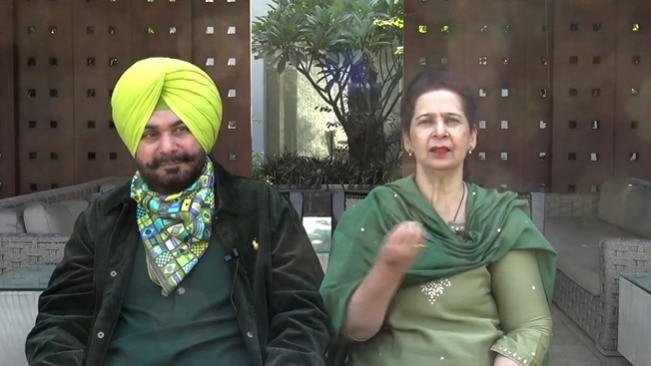Navjot Kaur Sidhu, a former MLA and wife of ex-cricketer-turned-politician Navjot Singh Sidhu, has been issued a staggering ₹850 crore legal notice by the Chhattisgarh Civil Society (CCS). This legal action follows claims made by her husband regarding her recovery from stage 4 cancer. The controversy arises from assertions that a strict diet inspired by Ayurveda and lifestyle changes, such as intermittent fasting, played a pivotal role in her recovery. According to Sidhu, these practices were instrumental in saving Kaur’s life, despite doctors purportedly giving her only 40 days to live.
The Claims
Navjot Singh Sidhu attributed his wife’s recovery to a regimen that reportedly included:
- Dietary Adjustments: A strict diet devoid of refined carbohydrates, sugar, dairy, and packaged foods, instead focusing on lentils, quinoa, fruits like berries and pomegranates, and nuts such as walnuts and Brazil nuts.
- Morning Rituals: Starting the day with warm lemon water, apple cider vinegar, raw garlic, raw turmeric, and neem leaves.
- Intermittent Fasting: Observing a fasting window of 12 to 17 hours after dinner.
- Anti-inflammatory Ingredients: Incorporating turmeric, holy basil (tulsi), and other herbal remedies.
- Alkaline Water: Drinking water with a pH level of 7.
Sidhu emphasized that these measures were undertaken in consultation with doctors and were part of a broader treatment plan that also included surgeries and chemotherapy. However, his focus on these alternative methods has sparked widespread criticism.
The Legal Notice
The CCS has demanded that Navjot Kaur Sidhu provide evidence to substantiate these claims within seven days, failing which they have threatened legal repercussions. Their notice outlines concerns over the potential harm that such statements could cause:
- Public Misleading: The CCS alleges that Sidhu’s statements could mislead cancer patients into abandoning proven medical treatments in favor of unverified dietary regimens.
- Impact on Allopathic Medicine: The society argues that these claims undermine public confidence in allopathic treatments, which are supported by rigorous clinical research.
- Potential Public Health Risks: The promotion of unproven remedies could endanger lives by discouraging timely and evidence-based medical interventions.
The ₹850 crore compensation demand is intended to account for the potential damages caused by such misinformation. Additionally, the CCS has urged Kaur to publicly clarify her stance on her husband’s claims.
Medical Community’s Response
Medical professionals and oncologists have strongly criticized Sidhu’s assertions, warning against the dangers of promoting unverified treatments. Experts from premier institutions such as AIIMS and Tata Memorial Hospital have stated:
- Diet as a Support, Not a Cure: While dietary and lifestyle changes can complement cancer treatment, they cannot replace established therapies like chemotherapy, surgery, or radiation.
- Lack of Scientific Evidence: The claims lack backing from peer-reviewed research and clinical trials.
- Risk of Misinformation: Highlighting anecdotal success stories without scientific validation can lead to poor treatment decisions among patients.
Dr. Sunil Rao, an oncologist at Tata Memorial Hospital, remarked, “Cancer is a complex disease that requires a multidisciplinary approach. While good nutrition can help during treatment, it is not a substitute for medical interventions.”
Potential Legal Ramifications
If Navjot Kaur fails to provide the requested evidence, the CCS is prepared to escalate the matter. The consequences could include:
- Financial Penalties: The ₹850 crore demand is a significant claim, highlighting the perceived gravity of the issue.
- Public Accountability: The CCS may push for Kaur to publicly retract or clarify her position to mitigate the misinformation’s impact.
- Legal Actions: The society could initiate defamation lawsuits or pursue action under laws related to public health and safety.
Legal experts suggest that if the matter proceeds to court, it could set a precedent for holding public figures accountable for making unverified health claims.
Broader Implications
The controversy raises important questions about the role of public figures in shaping health narratives, particularly regarding alternative medicine.
Impact on Public Perception
- Skepticism Toward Alternative Remedies: The legal notice may prompt heightened scrutiny of alternative cancer treatments, discouraging patients from pursuing unverified options.
- Erosion of Trust: Public trust in proponents of alternative medicine may decline, especially when claims are not supported by evidence.
Reinforcement of Evidence-Based Medicine
The case underscores the importance of evidence-based approaches in healthcare. Medical experts hope it will encourage patients to rely on scientifically validated treatments rather than anecdotal claims.
Media and Narrative Shaping
Extensive media coverage has brought the debate into the spotlight. Critics argue that sensationalizing anecdotal recovery stories without context could mislead vulnerable individuals, particularly those battling life-threatening illnesses.
Public Health Concerns
The CCS’s notice highlights a critical public health issue: the dissemination of unverified health information. In a country like India, where access to accurate medical advice can be challenging for many, such claims carry the risk of significant harm.
Dr. Meenakshi Sharma, a public health expert, commented, “Misinformation about cancer treatments can delay timely medical care and lead to irreversible consequences. We must prioritize science over anecdotes.”
Navjot Kaur Sidhu’s Next Steps
As the deadline set by the CCS approaches, all eyes are on Navjot Kaur Sidhu. Her response could determine the legal and public fallout from this controversy. Key questions remain:
- Will she provide evidence supporting her husband’s claims?
- Will she issue a public clarification to address the CCS’s concerns?
Failure to address these demands could result in legal battles, financial liabilities, and reputational damage.
The legal notice against Navjot Kaur Sidhu serves as a stark reminder of the responsibilities that public figures bear when making health-related claims. While stories of recovery and resilience can inspire hope, they must be shared responsibly, with due regard for scientific evidence and public safety.
This incident has sparked a broader conversation about the intersection of medicine, alternative therapies, and the role of public discourse in shaping healthcare decisions. As the debate unfolds, the case may set a significant precedent for accountability in health advocacy.



